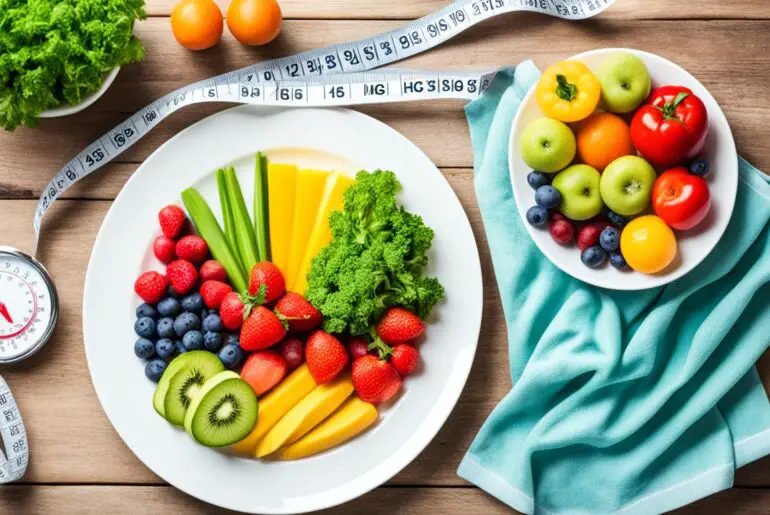When it comes to managing hunger during weight loss journeys, many people turn to appetite suppressants for assistance. But what about those following the HCG diet? Can natural hunger suppressants provide the same benefits for HCG users? Are there specific suppressants that are effective in controlling cravings while on this controversial diet?
The HCG diet, which involves severe calorie restriction and the use of Human Chorionic Gonadotropin (HCG), has gained popularity in recent years. Supporters claim that HCG helps curb hunger and facilitates weight loss. However, the FDA does not recommend the use of HCG for weight loss, and over-the-counter HCG products are considered illegal and unsafe.
So, how can individuals on the HCG diet effectively manage hunger without compromising their health? Are there natural appetite suppressants that can provide a safe and sustainable solution? In this article, we delve into the world of natural hunger suppressants for HCG, exploring their effectiveness and providing insights on healthy appetite management.
Key Takeaways:
- The FDA does not recommend the use of HCG for weight loss, and over-the-counter HCG products are illegal and unsafe.
- The HCG diet involves severe calorie restriction, which can lead to short-term weight loss but is not a sustainable or healthy approach.
- There are natural hunger suppressants that can help manage cravings on the HCG diet, but their effectiveness may vary.
- Staying well-hydrated, consuming coffee or green tea, spacing out meals, and incorporating “free foods” can be effective strategies for managing hunger on the HCG diet.
- Consulting with a healthcare professional is essential for safe and effective weight loss methods, avoiding potential risks and side effects associated with the HCG diet.
The HCG Diet and Hunger
While following the HCG diet, managing hunger can be a concern, particularly in the early stages when the body is adjusting to the program. However, hunger on the HCG diet is usually manageable, and there are effective ways to suppress appetite and minimize cravings.
One powerful strategy is to prioritize hydration by drinking 2-4 liters of water per day. Staying well-hydrated not only promotes overall health but also helps to suppress appetite, making it easier to stick to the low-calorie requirements of the HCG diet.
Another natural appetite suppressant that can be incorporated into the HCG diet is coffee or green tea. These beverages have been shown to help reduce hunger and curb cravings, providing an additional tool for managing appetite while on the diet.
Proper meal spacing and ensuring adequate protein intake are also essential in managing hunger on the HCG diet. By spacing out meals and making sure to include a sufficient amount of protein in each meal, individuals can achieve a longer-lasting feeling of satiety and reduce hunger pangs throughout the day.
Addititionally, incorporating “free foods” into meals can also help manage hunger without adding excessive calories. Certain vegetables, such as spinach, tomatoes, and cucumbers, are low in calories and can be included in larger quantities to satisfy hunger while still adhering to the HCG diet guidelines.
By implementing these strategies and making conscious choices to manage hunger, individuals following the HCG diet can experience appetite suppression and better adherence to the program. With a balanced approach, hunger on the HCG diet can be effectively managed, enhancing the chances of achieving successful weight loss goals.
Note: The image above represents the challenges of hunger on the HCG diet.
The Science Behind the HCG Diet

When it comes to the science behind the HCG diet, the evidence does not support its claims. While any very low-calorie diet can lead to weight loss, studies have shown that HCG itself has no significant impact on weight loss.
The HCG diet involves severely limiting caloric intake to just 500 calories per day while taking HCG, which can be administered through injections or homeopathic products. However, it’s important to note that the FDA has not approved HCG for weight loss, and over-the-counter HCG products are illegal.
This strict calorie restriction can be dangerous as it does not provide the body with adequate nutrition and may lead to protein deficiencies. The HCG diet’s effectiveness for weight loss is not backed by scientific research, and its potential risks should be taken into consideration.
The table below summarizes the key points regarding the science behind the HCG diet:
| Evidence | Impact on Weight Loss | Regulatory Status | Potential Risks |
|---|---|---|---|
| Lack of scientific evidence | No significant impact | Not approved by FDA | Risk of nutritional deficiencies and protein deficiencies |
The HCG Diet Plan
The HCG diet plan offers a structured approach to weight loss, designed to be followed for a specific period of time. This plan consists of consuming two meals per day, lunch and dinner, each carefully curated to include specific food groups. The meal restrictions on the HCG diet are essential to ensure maximum results and aid in maintaining the desired calorie intake.
Allowed Foods on the HCG Diet:
| Food Group | Examples |
|---|---|
| Protein | Lean meats (veal, beef, chicken breast, seafood) |
| Vegetables | Spinach, tomatoes, cucumbers |
| Bread | Breadstick or piece of melba toast |
| Fruit | Oranges, apples, strawberries, grapefruits |
To enhance hydration and satiety, individuals on the HCG diet are encouraged to drink plenty of water throughout the day. Coffee and tea are also permitted, but it is recommended to consume them without sugar or cream. Artificial sweeteners can be used to add flavor to beverages while complying with the meal restrictions.
“The HCG diet plan offers a structured approach to weight loss, designed to be followed for a specific period of time.”
Strict adherence to the HCG diet plan is crucial for achieving the desired weight loss goals. It is important to note that oils and butter are not permitted on the HCG diet, as they add unnecessary calories. By following the allowed foods list and portion control guidelines, individuals can maximize the benefits of the HCG diet.
Challenges of the HCG Diet

Embarking on the HCG diet comes with its fair share of challenges. The most notable is the strict calorie limit of only 500 calories per day. This extreme level of calorie restriction can be physically and emotionally demanding, making it uncomfortable and difficult to sustain for most individuals.
Moreover, meeting all nutritional needs on such a low-calorie diet can be quite challenging. The limited food choices and portion sizes on the HCG diet may result in deficiencies in vital nutrients like protein, vitamins, and minerals. These nutritional deficiencies can have adverse effects on overall health and can hinder long-term weight loss success.
The HCG diet heavily relies on animal protein sources, which may make it unsuitable for vegetarians looking to follow this weight loss regimen. The restricted food options may also present difficulties for individuals following a gluten-free or vegan diet.
Addressing these challenges is crucial to ensure the safety and efficacy of any weight loss plan. Proper management of calorie intake, nutritional needs, and personal dietary preferences is vital in creating a sustainable and healthy approach to weight loss.
Strategies to overcome challenges:
-
Consult with a healthcare professional: Seeking guidance from a healthcare professional who specializes in weight management can provide valuable insights into overcoming the challenges of the HCG diet. They can develop a tailored plan that takes into account specific dietary requirements and offers appropriate alternatives, ensuring nutritional adequacy.
-
Monitor nutrient intake: Keeping track of nutrient intake, particularly protein, vitamins, and minerals, can help identify any deficiencies and allow for appropriate supplementation if necessary. This can be done through regular blood tests and consultation with a healthcare professional.
-
Explore vegetarian alternatives: For vegetarians interested in the HCG diet, it is important to consider alternative protein sources such as tofu, tempeh, and seitan to ensure adequate protein intake. Consulting with a registered dietitian or nutritionist can provide valuable insights into balancing the HCG diet with personal dietary preferences.
-
Adopt a balanced approach: Incorporating a variety of nutrient-dense foods, including fruits, vegetables, whole grains, lean proteins, and healthy fats, into the HCG diet can help ensure a more balanced nutritional profile. This can help mitigate any deficiencies caused by the limited food choices on the HCG diet.
-
Stay well-informed: Educating oneself about the potential challenges and risks associated with the HCG diet is essential. Understanding the limitations and potential consequences can empower individuals to make informed decisions and explore alternative weight loss methods that prioritize overall health and well-being.
| Challenges | Strategies to Overcome |
|---|---|
| Strict calorie limit of 500 calories per day | Consult with a healthcare professional |
| Nutritional deficiencies | Monitor nutrient intake |
| Unsuitable for vegetarians | Explore vegetarian alternatives |
| Incompatible with gluten-free or vegan diets | Adopt a balanced approach |
| Stay well-informed |
Overcoming the challenges of the HCG diet involves thoughtful planning, professional guidance, and a focus on maintaining a well-balanced and sustainable approach to weight loss. By addressing these challenges head-on, individuals can navigate the HCG diet more effectively, ensuring their overall health and long-term success.
Safe and Effective Weight Loss Alternatives
If weight loss is your goal, there are safer and more effective alternatives to the HCG diet. It is essential to consult with a healthcare professional for personalized advice on weight loss and to ensure the chosen method aligns with your specific needs and health conditions.
Implementing healthy lifestyle changes is a sustainable and effective approach to weight loss. By adopting a balanced diet, incorporating regular physical activity, and making long-term adjustments to your habits, you can achieve significant and lasting results. This holistic approach promotes overall well-being and sets the foundation for successful weight management.
A healthcare professional can provide crucial guidance on incorporating natural hunger suppressants, such as high-fiber foods and appetite control strategies, into your weight loss plan. These methods support a healthy and sustainable approach to controlling cravings and managing hunger, ensuring you stay on track with your weight loss journey.
By choosing safe and effective weight loss alternatives and making healthy lifestyle changes, you prioritize your health while achieving your weight loss goals. Remember, the journey is unique to you, and with the right support and guidance, you can make positive, lasting changes for a healthier future.
Risks and Side Effects of the HCG Diet

The HCG diet carries several risks and potential side effects that individuals should be aware of before considering it as a weight loss method. The extreme calorie restriction involved in the diet can lead to various health complications:
- Gallstone formation
- Irregular heartbeat
- Vitamin and mineral deficiencies
- Electrolyte imbalances
In addition to these risks, reported side effects of the HCG diet include:
- Fatigue
- Irritability
- Restlessness
- Depression
- Fluid buildup
- Swelling of the breasts in males
Furthermore, there is a potential risk of blood clots forming and blocking blood vessels. These risks and side effects highlight the potential dangers of the HCG diet and the importance of prioritizing safety when choosing a weight loss method.
The HCG Diet and FDA Regulations

The HCG diet and over-the-counter HCG products are not approved by the FDA for weight loss. The FDA has issued warning letters to several companies that market homeopathic HCG products due to their illegal status. While prescription HCG injections can be legally administered by healthcare providers for fertility treatment, over-the-counter HCG products are not approved and should be avoided. It is essential to prioritize safety and only rely on FDA-approved methods for weight loss.
When it comes to weight loss, it is crucial to consider the regulations set forth by the FDA. The HCG diet and its accompanying products have not been granted approval for weight loss by the FDA. This means that over-the-counter HCG products, including homeopathic versions, are not endorsed or considered safe for weight loss purposes.
In response to the illegal marketing and sale of HCG products, the FDA has taken action by issuing warning letters to several companies. These warning letters serve as a stern reminder that the sale of over-the-counter HCG products is prohibited and carries risks for consumers.
Prescription HCG Injections for Fertility Treatment
It is important to note that prescription HCG injections, when administered by healthcare providers, are legal and approved for fertility treatment. These injections are specifically intended for reproductive health purposes and should not be confused with over-the-counter HCG products marketed for weight loss.
Healthcare professionals closely monitor the use of prescription HCG injections to ensure their safety and effectiveness in fertility treatment. However, it is essential to consult with a healthcare professional and follow their guidance when considering the use of prescription HCG injections for any purpose.
When it comes to weight loss, it is strongly advised to rely on FDA-approved methods and consult with a healthcare professional for personalized advice. Prioritizing safety and adhering to FDA regulations is crucial for achieving healthy and sustainable weight loss.
Conclusion
The HCG diet, although popular, is a controversial and potentially unsafe weight loss method that is not recommended by the FDA. It poses risks of nutritional deficiencies and other side effects, such as gallstone formation and electrolyte imbalances. Instead, individuals seeking to lose weight should consider adopting a balanced diet and engaging in regular exercise as safer and more effective alternatives.
Consulting with a healthcare professional is crucial when exploring weight loss methods. They can provide personalized guidance and support, taking into account individual health needs and goals. Prioritizing overall health and well-being should always be the focus, rather than relying on extreme and potentially harmful dietary approaches like the HCG diet.
In conclusion, the HCG diet is not a sustainable or healthy approach to weight loss. It is crucial to prioritize safety and make informed choices based on reputable research and expert advice. By embracing a balanced lifestyle, individuals can achieve long-term weight management and improve their overall well-being.
FAQ
What are natural hunger suppressants for HCG?
Natural hunger suppressants for HCG are substances or strategies that can help reduce appetite while following the HCG diet. These may include staying well-hydrated, consuming coffee or green tea, spacing out meals, ensuring adequate protein intake, and incorporating certain vegetables into meals.
How can I manage hunger on the HCG diet?
Hunger on the HCG diet can be managed by staying well-hydrated, consuming coffee or green tea, spacing out meals, ensuring adequate protein intake, and incorporating “free foods” such as certain vegetables into meals.
What is the science behind the HCG diet?
The scientific evidence does not support the claims of the HCG diet. While any very low-calorie diet can result in weight loss, studies have found that HCG has no significant impact on weight loss.
What does the HCG diet plan consist of?
The HCG diet plan consists of consuming two meals per day, lunch and dinner, each containing one protein, one vegetable, one bread, and one fruit. Certain foods like lean meats, certain vegetables, specific fruits, and beverages like water, coffee, and tea are allowed.
What are the challenges of the HCG diet?
The main challenges of the HCG diet include the strict calorie limit of 500 calories per day, meeting nutritional needs, and suitability for certain dietary restrictions like vegetarian, gluten-free, or vegan diets.
What are safe and effective weight loss alternatives to the HCG diet?
Safe and effective weight loss alternatives to the HCG diet include adopting a balanced diet, engaging in regular physical activity, and consulting with a healthcare professional for personalized advice.
What are the risks and side effects of the HCG diet?
The risks and side effects of the HCG diet include nutritional deficiencies, gallstone formation, irregular heartbeat, fatigue, irritability, restlessness, depression, fluid buildup, swelling of the breasts in males, and a risk of blood clots forming.
What are the FDA regulations regarding the HCG diet?
The FDA has not approved HCG for weight loss, and over-the-counter HCG products are illegal. The FDA has issued warning letters to several companies that market homeopathic HCG products due to their illegal status.
What is the conclusion regarding the HCG diet?
The HCG diet is a controversial and potentially unsafe weight loss method. It is not recommended by the FDA and carries risks of nutritional deficiencies and other side effects. Safer and more effective alternatives for weight loss exist, such as adopting a balanced diet and engaging in regular exercise.




